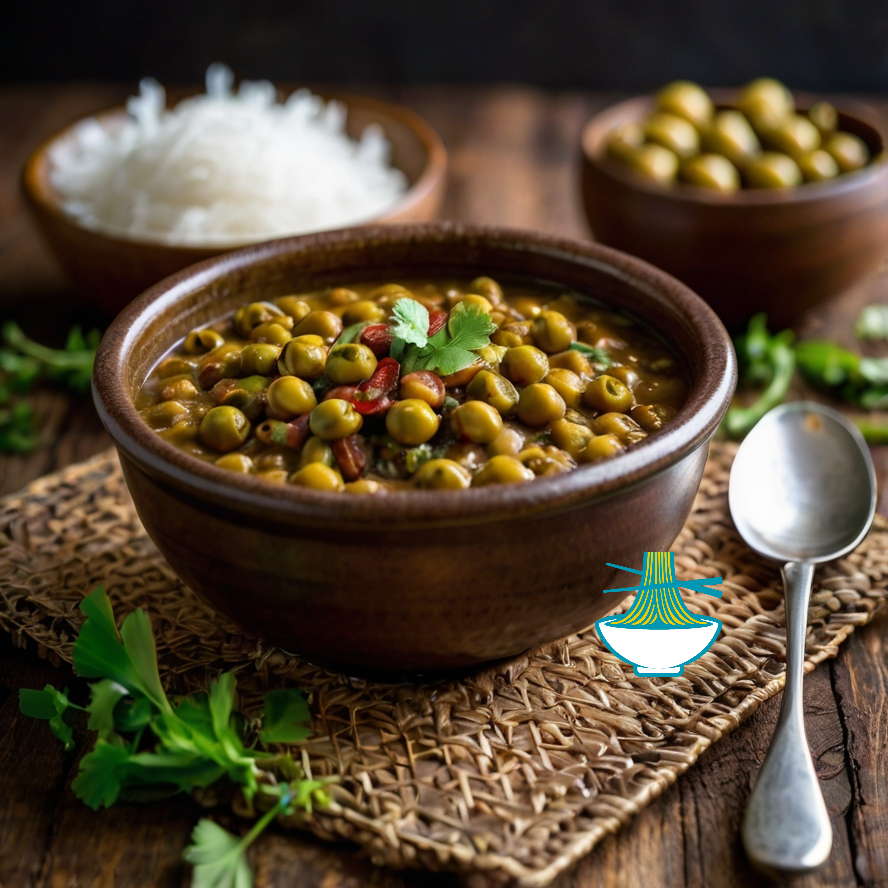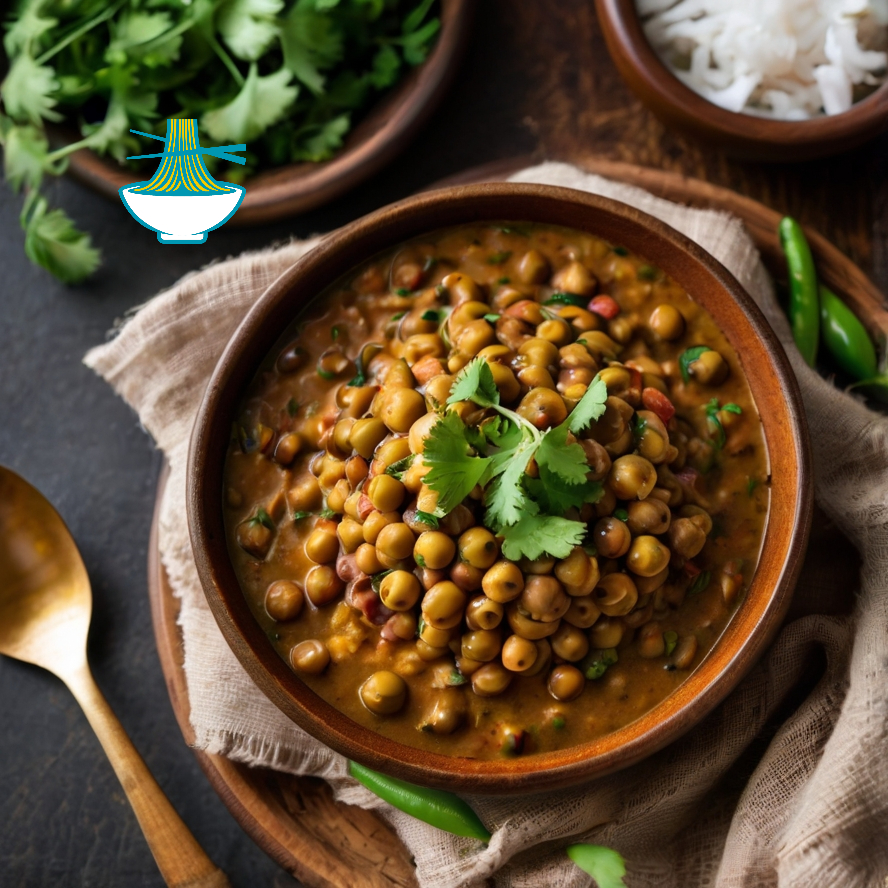The recipe for stewed pigeon peas is a delightful blend of Caribbean flavors, featuring tender pigeon peas simmered in a rich and aromatic sauce made with coconut milk, herbs, and spices. This dish is a staple in many Caribbean cuisines, known for its hearty texture and comforting taste. Pigeon peas, also known as gungo peas or Congo peas, have a long history in Caribbean cooking, believed to have been introduced to the region by African slaves. Over time, they became a vital ingredient in numerous traditional dishes, including this savory stew. The combination of ingredients creates a harmonious balance of flavors, making it a beloved dish enjoyed by many.
Ingredients:
- 2 cups pigeon peas (canned or cooked)
- 1 can (14 oz) coconut milk
- 1 onion, diced
- 2 cloves garlic, minced
- 1 bell pepper, diced
- 1 tomato, diced
- 1 teaspoon thyme leaves
- 1 teaspoon curry powder
- Salt and pepper to taste
- 2 tablespoons vegetable oil
- Fresh cilantro or parsley for garnish (optional)
Method:
- Heat vegetable oil in a large pot over medium heat. Add diced onion, minced garlic, and diced bell pepper. Sauté until onions are translucent and peppers are tender, about 5 minutes.
- Add diced tomato, thyme leaves, and curry powder to the pot. Stir well to combine and cook for another 2 minutes.
- Pour in the coconut milk and stir to incorporate all the ingredients. Allow the mixture to come to a simmer.
- Add the cooked pigeon peas to the pot, stirring to combine with the sauce. Let it simmer for 10-15 minutes, stirring occasionally, until the flavors meld together and the sauce thickens slightly.
- Season with salt and pepper to taste.
- Once done, remove from heat and garnish with fresh cilantro or parsley if desired.
- Serve the stewed pigeon peas hot as a delicious side dish or over rice for a satisfying meal. Enjoy!
Nutrition Value:
Pigeon Peas (2 cups, canned or cooked):
- Calories: Approximately 400 calories per cup (cooked).
- Carbohydrates: About 71 grams per cup.
- Protein: Approximately 26 grams per cup.
- Fat: Around 1.5 grams per cup.
- Sodium: Varies depending on whether they're canned or cooked; canned peas may have added sodium.
- Cholesterol: Zero.
- Vitamins and Minerals: Rich in folate, manganese, magnesium and phosphorus.
Benefit: Pigeon peas are a good source of plant-based protein, fiber, and various essential nutrients. They contribute to satiety, help maintain muscle mass, and support overall health.
Coconut Milk (1 can, 14 oz):
- Calories: Approximately 700 calories per can.
- Carbohydrates: Around 8 grams per serving (varies by brand).
- Protein: Approximately 7 grams per serving.
- Fat: High in fat, approximately 68 grams per serving, primarily saturated fat.
- Sodium: Varies by brand; some may have added sodium.
- Cholesterol: Zero.
- Vitamins and Minerals: Contains small amounts of several vitamins and minerals, including iron, magnesium, and potassium.
Benefit: Coconut milk adds creaminess and richness to dishes. It provides healthy fats and imparts a distinctive flavor but should be consumed in moderation due to its high saturated fat content.
Onion (1, diced):
- Calories: Approximately 44 calories per medium onion.
- Carbohydrates: Around 10 grams per onion.
- Protein: About 1 gram per onion.
- Fat: Minimal, less than 1 gram per onion.
- Sodium: Very low.
- Cholesterol: Zero.
- Vitamins and Minerals: Rich in vitamin C, vitamin B6, and potassium.
Benefit: Onions are low in calories and a good source of antioxidants and fiber. They add flavor and texture to dishes without significantly increasing calorie or fat content.
Garlic (2 cloves, minced):
- Calories: Approximately 4 calories per clove.
- Carbohydrates: About 1 gram per clove.
- Protein: Minimal.
- Fat: Minimal.
- Sodium: Minimal.
- Cholesterol: Zero.
- Vitamins and Minerals: Garlic is a good source of vitamin C, vitamin B6, and manganese.
Benefit: Garlic contains compounds with potential health benefits, including immune-boosting properties and cardiovascular support. It adds flavor to dishes without contributing significant calories or nutrients.
Bell Pepper (1, diced):
- Calories: Approximately 30 calories per medium bell pepper.
- Carbohydrates: Around 7 grams per pepper.
- Protein: About 1 gram per pepper.
- Fat: Minimal.
- Sodium: Very low.
- Cholesterol: Zero.
- Vitamins and Minerals: Rich in vitamin C, vitamin A, and potassium.
Benefit: Bell peppers are low in calories and high in antioxidants, particularly vitamin C. They add color, flavor, and crunch to dishes while providing essential nutrients.
Tomato (1, diced):
- Calories: Approximately 22 calories per medium tomato.
- Carbohydrates: Around 5 grams per tomato.
- Protein: About 1 gram per tomato.
- Fat: Minimal.
- Sodium: Very low.
- Cholesterol: Zero.
- Vitamins and Minerals: High in vitamin C, vitamin K, and potassium.
Benefit: Tomatoes are rich in antioxidants, especially lycopene, which may have health benefits such as reducing the risk of certain diseases. They add sweetness and acidity to dishes while providing essential nutrients.
Thyme Leaves (1 teaspoon):
- Calories: Negligible.
- Carbohydrates: Negligible.
- Protein: Negligible.
- Fat: Negligible.
- Sodium: Very low.
- Cholesterol: Zero.
- Vitamins and Minerals: Contains small amounts of vitamin K and manganese.
Benefit: Thyme adds flavor to dishes and may have antibacterial properties. While it doesn't contribute significant nutrients, it enhances the taste profile of the recipe.
Curry Powder (1 teaspoon):
- Calories: Negligible.
- Carbohydrates: Negligible.
- Protein: Negligible.
- Fat: Negligible.
- Sodium: Varies by brand; some may contain salt.
- Cholesterol: Zero.
- Vitamins and Minerals: Depends on the blend, but may contain small amounts of various vitamins and minerals.
Benefit: Curry powder is a blend of spices that typically includes turmeric, coriander, cumin, and other spices. It adds flavor and aroma to dishes without contributing significant calories or nutrients.
Salt and Pepper to Taste:
- Calories: Negligible.
- Carbohydrates: Negligible.
- Protein: Negligible.
- Fat: Negligible.
- Sodium: Depends on the amount added; should be used in moderation.
- Cholesterol: Zero.
Benefit: Salt enhances flavor, but excessive consumption can contribute to high blood pressure. Pepper adds a spicy kick and contains small amounts of antioxidants.
Vegetable Oil (2 tablespoons):
- Calories: Approximately 240 calories per tablespoon.
- Carbohydrates: Zero.
- Protein: Zero.
- Fat: Around 28 grams per tablespoon, primarily unsaturated fat.
- Sodium: Zero.
- Cholesterol: Zero.
- Vitamins and Minerals: May contain small amounts of vitamin E.
Benefit: Vegetable oil provides fat for cooking and adds richness to dishes. Opt for healthier options like olive oil or canola oil for their beneficial unsaturated fats.
Fresh Cilantro or Parsley for Garnish (optional):
- Calories: Negligible.
- Carbohydrates: Negligible.
- Protein: Negligible.
- Fat: Negligible.
- Sodium: Very low.
- Cholesterol: Zero.
- Vitamins and Minerals: Contains small amounts of vitamin K, vitamin C, and potassium.
Benefit: Cilantro or parsley adds freshness and a burst of flavor to dishes. They also provide small amounts of vitamins and minerals, contributing to overall nutrient intake.
This breakdown provides a comprehensive overview of the nutritional composition and benefits of each ingredient in your recipe. Enjoy your cooking!


Comments